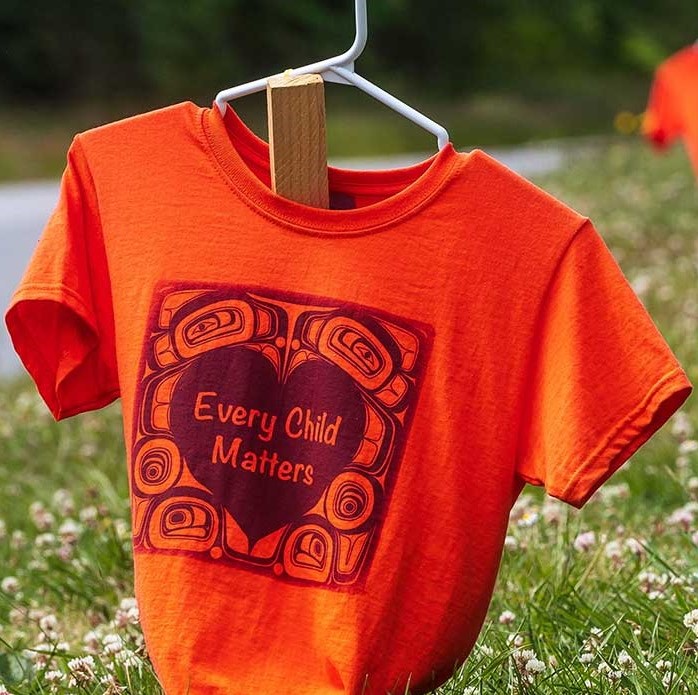
National Day for Truth and Reconciliation, also known as Orange Shirt Day, will take place on September 30. This is a day to honour and uphold the healing journeys of residential school survivors and their families, and to engage in meaningful discussions about the history and legacy of the residential school system. UBC Department of Emergency Medicine (DEM) staff, faculty and trainees are encouraged to participate in Orange Shirt Day, and to honour the intent of National Day for Truth and Reconciliation, whether through personal reflection or education and awareness activities, on this day and beyond.
As people across Canada observe this day and acknowledge the painful history and legacy of residential schools, it is important to also recognize the ongoing impacts that colonialism, government policies and discrimination continue to have on the health and wellbeing of Indigenous Peoples.
As an academic institution committed to promoting excellence in emergency care, the objective of the DEM is to educate, develop and mentor current and future health practitioners to serve the health needs of various communities across the province.
“We know that health inequities exist for Indigenous Peoples due to many factors, including physician biases,” said Dr. John Tallon, Clinical Professor and Co-Head of the UBC DEM. “It is our job to optimize care and outcomes for Indigenous Peoples by providing high-quality, culturally sensitive training to current and future emergency care physicians.”
“It is important to recognize flaws of the past so we can make positive changes for a more inclusive and equitable future health care system that provides the best possible care to the culturally and geographically diverse population within our province,” added Dr. Roy Purssell, Professor and Co-Head of the UBC DEM.
In early 2022, Dr. Ka Wai Cheung and Dr. Gina Gill were appointed as UBC DEM’s Equity, Diversity and Inclusion (EDI) co-chairs. Part of their work involves ensuring that recruitment, selection and training practices of new emergency medicine residents are carried out under an EDI lens.
“We are learning together, and we believe we are taking the necessary steps to recruit, select and train the emergency physicians who will work to change the system for the better,” said Dr. Gina Gill, Clinical Assistant Professor and EDI Co-Chair of the UBC DEM.
“We know that changing the system is a tremendous undertaking and we have barely scratched the surface,” added Dr. Ka Wai Cheung, Clinical Associate Professor and EDI Co-Chair of the UBC DEM. “Acknowledging National Day for Truth and Reconciliation is a significant first step as the DEM moves collectively to acknowledge the past and create a future where Indigenous Peoples will receive respectful, culturally sensitive care throughout the province.”
In addition to the EDI work under way, the UBC InterCultural Online Health Network (iCON) project works collaboratively with Vancouver Coastal Health (VCH) Indigenous Health, as well as Vancouver Physician Staff Association (VPSA) leaders and the BC First Nations Health Authority (FNHA) to prioritize and advance Indigenous cultural safety in health care settings. Part of this work involves planning and hosting Indigenous Health Rounds, which serve as a platform to introduce health care professionals to Indigenous traditional healing, patient stories, and dimensions of wellness. They also allow participants to reflect on their own practices and how they could apply cultural safety knowledge and skills to in-person and virtual clinical care settings.
The Indian Residential School History and Dialogue Centre (IRSHDC) at UBC addresses the colonial legacy of residential schools and other policies imposed by the Canadian government on Indigenous Peoples, and ensures that this history is acknowledged, examined and understood within the UBC community. Learn more about the Centre’s work, including how to visit the Centre in person and engage with events and programming, at irshdc.ubc.ca. To learn more about UBC’s Indigenous academic and administrative initiatives and resources, and to find out how you can support Indigenous Peoples and honour their healing journeys through allyship, education and self-reflection, visit https://indigenous.ubc.ca/.
UBC Faculty of Medicine will hold a virtual commemorative event on Tuesday, Sept. 27 from 10 – 11:30 a.m. for National Day for Truth and Reconciliation. Together with Faculty leadership and community members, Dermot Kelleher, Dean of the Faculty of Medicine and Vice-President of Health at UBC, will reflect on the purpose of Orange Shirt Day and vow to reaffirm and deepen their commitment to advance their work in collaboration with First Nations and Indigenous peoples of British Columbia and beyond. The event will be guided by Derek Thompson, Thlaapkiituup, Indigenous Initiatives Advisor, and Namaste Marsden, Masemtxoxw, Director, Indigenous Engagement. Event details are available at https://www.med.ubc.ca/2022-commemorative-event-for-orange-shirt-day-national-day-for-truth-and-reconciliation/


